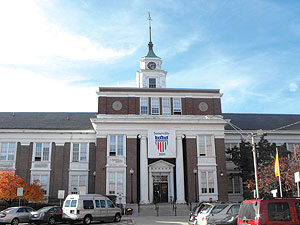City introduces 8 weeks of paid family medical leave, reducing financial risks to new parents, caregivers, and workers facing critical illness – and increasing worker retention
Mayor Katjana Ballantyne is proud to announce the introduction of a new eight-week paid family medical leave (PFML) benefit for eligible city employees. This significant enhancement to employee benefits aims to lower the financial risks to employees taking qualifying parental or family medical leave, reducing the likelihood of unpaid leave when welcoming a new child or facing illness.
The initiative is part of a broader effort by the Ballantyne administration to not only invest in the city’s workforce and advance worker equity but to lead on building a quality workplace environment. Recent advances in pay equity, strong new union contracts, and steady modernization of benefits are all part of a push to attract, support, and retain quality workers for the community, which improves services and lowers costs.
The Family and Medical Leave Act (FMLA), enforced by the U.S. Department of Labor, allows eligible public and private employees nationwide to take up to 12 weeks of unpaid, job-protected leave in a 12-month period for specific family and medical reasons. But FMLA, established in 1993, does not require compensation during a leave.
The benefit is a significant step forward. For example, currently, Somerville offers most employees two weeks of paid parental leave. That will now increase four-fold to eight weeks not just for new parents but will also introduce, for the first time, dedicated paid leave for others in need of medical or caregiver leave.
“We recognize that the arrival of a new child or a serious medical situation shouldn’t force our employees into financial hardship,” said Mayor Ballantyne. “By providing paid family and medical leave, we’re giving our workers the security they need to focus on what truly matters – their and their families’ health and well-being – without the added stress of lost income. This is about protecting our workforce both from the financial fallout that too often accompanies life’s most challenging moments and also giving them the best chance at a healthy recovery. Its also about controlling costs for our community. Workers are expensive to replace, and research shows they are more likely to return to their jobs after a paid leave than an unpaid leave.”
The new PFML program is distinct from standard sick, vacation, and personal time. In addition to that time, it provides employees with up to eight additional weeks of paid leave for qualifying life events, such as parental leave, critical illness, caregiver needs, or family medical issues. Once the new paid benefit is depleted, employees may cover any remaining period of absence with their accrued paid time off.
“This benefit is designed to keep more workers financially stable during a crisis or when growing their families, and research shows this not only benefits employees it helps protect our investment in them,” said Anne Gill, Director of Human Resources. “Paid family leave has been shown to dramatically increase staff retention and improve morale, which matters. It’s not just costly to hire and train new employees, it’s very time intensive. The impacts of the loss of workplace knowledge when employees leave should also not be underestimated. Offering paid leave is a win-win for the community— we support our workers and they in turn keep serving all of us.”
The benefit goes into effect on April 6, 2025. The same medical practitioner approvals and documentation that are currently required for FMLA (Family Medical Leave Act) leave also apply to PFML. To be eligible, employees must have worked a minimum of one full year for the City and at least 1,250 hours in the past year.
Recent City workforce initiatives and efforts include:
-
The City’s Wage and Compensation Study, which took on wage bias and wage equity by researching and reclassifying positions to ensure comparable pay for similar work across departments. This study has been instrumental in promoting equitable and competitive compensation.
-
Five new union contracts as mentioned above including the
landmark SMEU Unit B agreement, which features unprecedented 14%-17% average salary increases in FY25, addresses long-standing wage bias, and was based on comprehensive analysis of regional compensation for 90+ job titles.
-
Enhanced benefits across union agreements including improved salaries, modernized unbiased job titles, expanded and updated benefits, and stipends.
-
Employee training investments across departments both in relation to specific skills development and for overall customer service training.
-
Introduction of a non-union wage and compensation adjustment in parallel to union adjustments to similarly address non-union wage bias and bring compensation to competitive standards.
“We are strengthened by investing in our staff, which is why my administration is taking significant steps to ensure that our workforce is compensated fairly and that our benefits not only rise to modern standards but lead on them. These agreements and benefits are advances toward equity that are decades overdue,” said Mayor Ballantyne. “My goal is to be sure we are a city where every worker’s contribution is compensated fairly so we can attract and retain the best talent and staff.”
— City of Somerville
